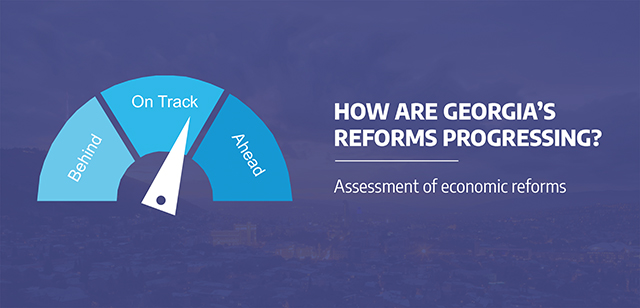One of the expected results of the project is to increase the public’s awareness of Georgia’s economic reforms, which itself is an important determinant of successful reform implementation process
This November, the ISET Policy Institute introduced ReforMeter, a platform designed as a Georgian Reform Progress Tracking System, one which critically informs beneficiaries and stakeholders about how the latest economic reforms in Georgia are developing.
The project is implemented by the ISET Policy Institute and supported by the USAID Economic Governance Program. The goal is to generate a reform progress analysis for policy making and public dialogue, and thereby promote informed debate about reform priorities and policy decisions, improve accountability, and help build trust between the government, the private sector and the general public.
At this point, Capital Market, Tax dispute and Insolvency reforms are covered. In total, six economic reforms will be assessed throughout the project implementation.
The ReforMeter site also offers a Georgian Economic Performance Index (G-EPI) and Georgian Economic Sentiment Index (G-ESI). The G-EPI is a combined indicator that examines the overall performance of the country’s economy, and reports deviations from the desired level of economic performance. The desired level of selected macro variables is defined based on the benchmarks given in the government strategy documents. The G-EPI is comprised of 5 important macro indicators: %GDP, Inflation Rate, Export/GDP, Current Account Deficit/GDP, and Budget Deficit/GDP. It is designed for simplicity, making it easier for professionals and laypeople alike to understand and apply it to the Georgian economy.
The Georgian Economic Sentiment Index (G-ESI) combines consumer and business perceptions about current financial/commercial status and expectations, based on two surveys conducted by ISET Policy Institute: The Consumer Confidence Index (CCI), and the Business Confidence Index (BCI).
The hybrid presentation event of ReforMeter was held at the Grand Sheraton Metechi Palace and was opened by Peter A. Wiebler, Mission Director of USAID Georgia, Natalia Beruashvili, Chief of Party of the USAID Economic Governance Program, and Tamar Sulukhia, ISET’s Director.
Following the presentation of ReforMeter by the Lead Economist Giorgi Papava, the event continued with two panel discussions that included various esteemed speakers and representatives from several key public institutions.
ReforMeter aims to inform stakeholders on how new reform efforts of the Georgian government have progressed against their intended objectives
The first panel, moderated by Tamar Sulukhia, focused on the implementation of select reforms (the Capital Market Development, Tax Dispute Resolution, and the Insolvency reforms). The distinguished panelists, representing the National Bank of Georgia, Parliament of Georgia, Ministry of Economy and Sustainable Development, Ministry of Finance, and Ministry of Justice, discussed the current position of these reforms and went on to stress the significance of the ReforMeter in Georgia’s economic agenda.
In the second panel, moderated by Natalia Beruashvili of the USAID Economic Governance Program and comprised of the ReforMeter’s Steering Committee members – Sebastian Molineus (World Bank), Shane Rosenthal (Asian Development Bank), Giorgi Cherkezishvili (Investors Council), and Aleksi Aleksishvili (PMCG), the panelists considered Georgia’s past experiences of implementing economic reforms and outlined the numerous critical elements required to ensure adequate reform processes.
Long-term US Support for Monitoring Reforms
The ReforMeter platform was first developed with USAID support in 2017 under the USAID Governance for Growth Program. Natalia Beruashvili, Chief of Party at the USAID Economic Governance Program explains: “The USAID Economic Governance Program empowers stakeholders to monitor and assess the progress of reforms through the Georgian Reform Progress Tracking System. Known as the ReforMeter, the platform was originally created with USAID support to make the reform process more transparent by raising awareness about the reforms and ensuring that stakeholders and citizens are involved in the policy-making process.”
The ReforMeter tool is a key part of the US Government’s long-term strategy for economic growth in Georgia. “USAID promotes evidence-based policy-making and Public-Private Dialogue to ensure all stakeholders are fairly heard. This is essential for the accountability of the Government of Georgia.
Further, it is important for the country’s economic and democratic development, and its continued Euro-Atlantic integration,” says Marika Olson, Economic Growth Office Director at USAID/Georgia.
“ReforMeter is just one of the unique systems created for this purpose, not only tracking awareness about key economic reforms, but also ensuring that stakeholders and citizens are involved in the policy-making process”.
“Over the next three years, ReforMeter will assess and measure the progress of key economic reforms, such as: capital market reform, insolvency reform, tax dispute resolution reform, water resource management reform, trade policy reform/e-commerce, and state procurement reform. All those reforms are gamechangers for improved economic governance of the country”.
How does the ReforMeter work?
“ReforMeter aims to promote implementation of more effective, consistent, and efficient reforms by increasing the inclusiveness of the reform design and implementation process,” ISET’s Ana Burduli notes.
“We employ three major components in reform evaluation that are government survey, stakeholder survey and a set of objective indicators, used as a proxy for reform effectiveness to inform stakeholders on how new reform efforts of the Georgian government have progressed against their intended objectives. One of the expected results of the project is to increase the public’s awareness on Georgia’s economic reforms, which itself is an important determinant of successful reform implementation process. Apart from regular public-private meetings to be held in Tbilisi, under the ReforMeter platform, we plan to promote discussions around economic reforms in the regions as well. In addition, through our targeted information sessions, women and youth will further benefit from increased advocacy skills and enhanced knowledge of the reform process in the country.”
The project implementation process is overseen by a Steering Committee consisting of five voting members representing different segments of Georgian society (civil society, the private sector, and the international community) and two non-voting members representing the USAID Economic Governance Program and ISET.
The Steering Committee has a mandate to:
• Oversee project implementation in the capacity of an advisor, to ensure transparent reform progress tracking process and broad participation of the stakeholders;
• Guide the Executive Team in making decisions on key operational issues;
• Guide the project executive team on methodological issues;
• Allocate weights to each reform in ReformVerdict (summary score for the overall progress of ongoing reforms);
• Nominate and approve members of specific reform stakeholder groups and moderate the meetings (up to two times per year).
The Executive Team consists of ISET-PI staff and researchers who, in addition to developing and measuring the set of objective indicators, carry out day-to-day activities, including data collection, questionnaire design, and event planning, among others.
Each reform is evaluated, twice per year, by a group of stakeholders, namely, 15 individuals not affiliated with the government, but directly affected by the reform in question. Assuming a total of up to 6 reforms to be tracked in any single year, up to 12 stakeholder meetings will be held per year.
The entire group of stakeholders are convened at ISET in order to review the results of the government survey, as well as objective data and information about reform outcomes, which are collected and analyzed by the Project Team.
The Government Survey measures progress in the implementation of selected reforms based on indicators and timetables agreed upon with the implementing agencies.
Objective outcome indicators collected and analyzed by the Project Team measures the outcomes and impacts of each reform.
Each member of the group provides an anonymous quantitative assessment of the reform. The overall score for each reform is calculated as a simple average of individual assessments.
ReformVerdict is the overall assessment of all reforms automatically provided through a summary score, derived as a weighted average of scores assigned to each reform. The ReformVerdict score is adjusted, following stakeholder meetings. It also provides scores separately for
o Reform Content and Adequacy
o Current Performance
o Reform Progress
o Expected Outcomes
By Katie Ruth Davies














